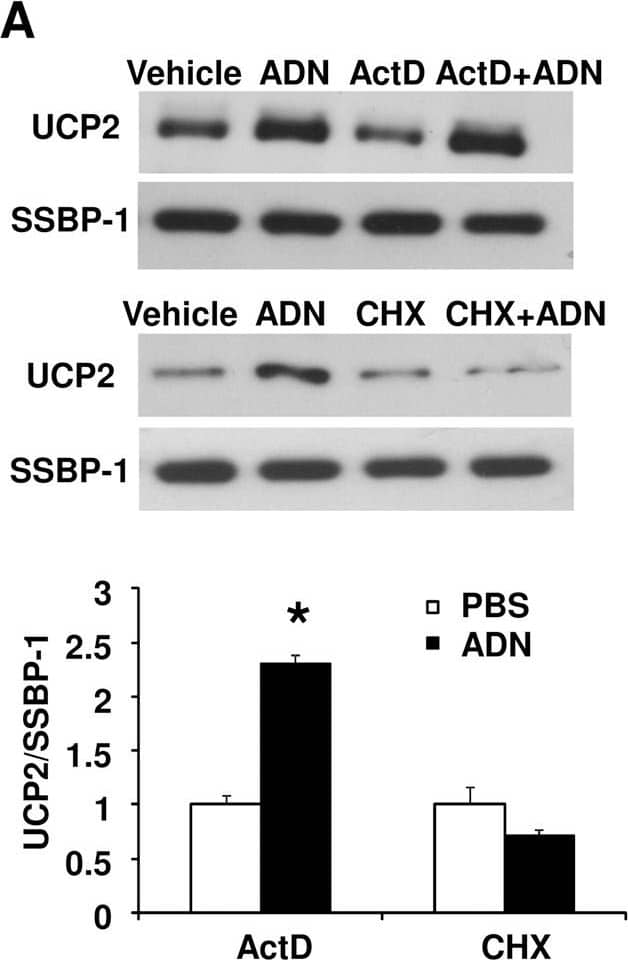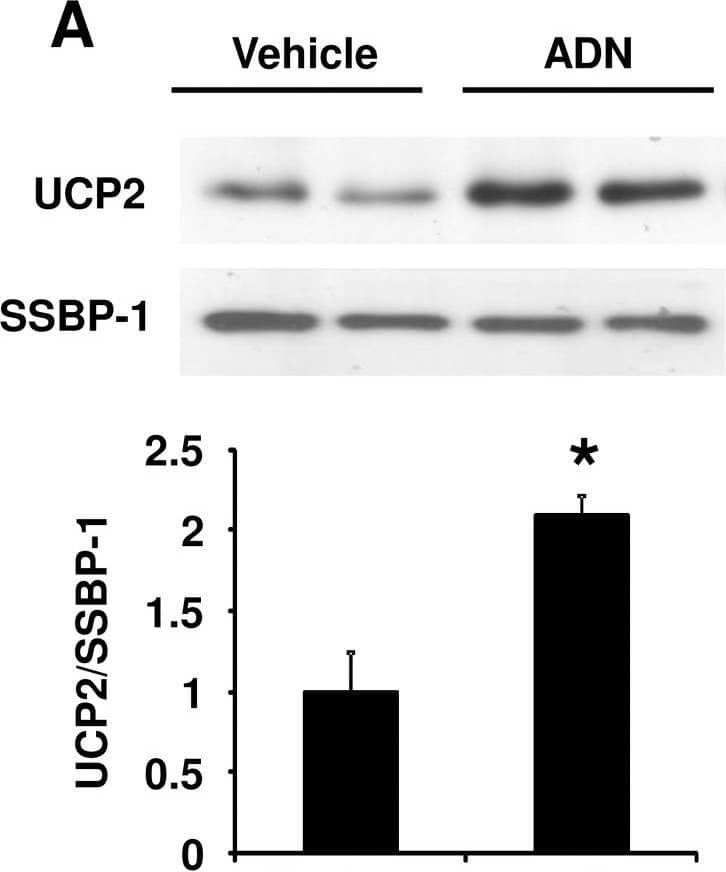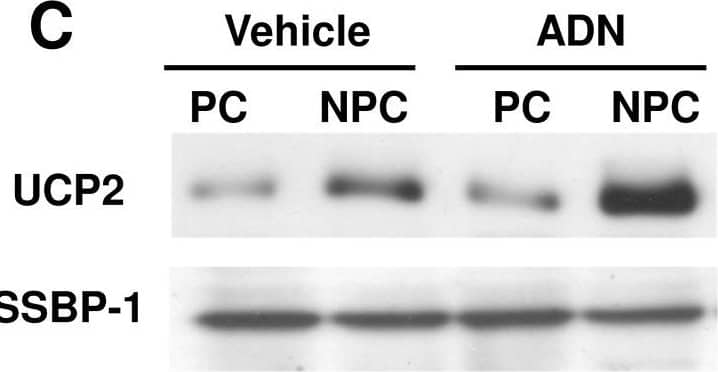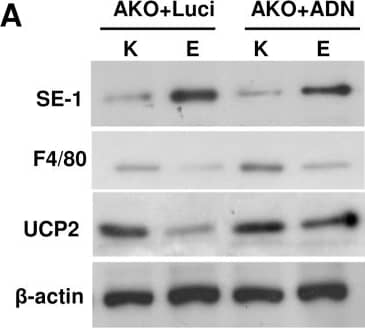Human/Mouse UCP2 Antibody Summary
Met1-Phe309
Accession # P55851
Applications
Please Note: Optimal dilutions should be determined by each laboratory for each application. General Protocols are available in the Technical Information section on our website.
Scientific Data
 View Larger
View Larger
Detection of Human/Mouse UCP2 by Western Blot. Western blot shows lysates of mouse brown adipose tissue. PVDF membrane was probed with 1 µg/mL Goat Anti-Human/Mouse UCP2 Antigen Affinity-purified Polyclonal Antibody (Catalog # AF4739) followed by HRP-conjugated Anti-Goat IgG Secondary Antibody (Catalog # HAF017). For additional reference, recombinant human UCP1, UCP2, UCP3, and UCP4 (5 ng/lane) were included. A specific band for UCP2 was detected at approximately 33 kDa (as indicated). This experiment was conducted under reducing conditions and using Immunoblot Buffer Group 4.
 View Larger
View Larger
Detection of Mouse UCP2 by Simple WesternTM. Simple Western lane view shows lysates of mouse brown adipose tissue, loaded at 0.2 mg/mL. A specific band was detected for UCP2 at approximately 38 kDa (as indicated) using 10 µg/mL of Goat Anti-Human/Mouse UCP2 Antigen Affinity-purified Polyclonal Antibody (Catalog # AF4739) followed by 1:50 dilution of HRP-conjugated Anti-Goat IgG Secondary Antibody (Catalog # HAF109). This experiment was conducted under reducing conditions and using the 12-230 kDa separation system.
 View Larger
View Larger
Detection of UCP2 by Western Blot Adiponectin enhances the mRNA stability of UCP2 and promotes its protein synthesis.Two inhibitors, actinomycin D (ActD, A, B and C) or cycloheximide (CHX, A, B and D), were administered together with or without adiponectin protein into liver tissues of AKO mice livers. The protein (A) and mRNA (B) abundance of UCP2 was monitored by Western blotting and QPCR, respectively. The relative protein expression was also monitored in PCs/NPCs lysates (C and D). *, P<0.05 vs corresponding controls, n = 3. Image collected and cropped by CiteAb from the following open publication (https://pubmed.ncbi.nlm.nih.gov/22359684), licensed under a CC-BY license. Not internally tested by R&D Systems.
 View Larger
View Larger
Detection of UCP2 by Western Blot Acute treatment with adiponectin elevates UCP2 expression in NPCs.PBS or 50 µg of murine adiponectin protein was injected into the portal vein of AKO mice livers. Liver tissues were collected for evaluation of UCP2 expression. The protein abundance in mitochondria (A), mRNA expression in total tissue lysates (B), and the protein content in PC and NPC fractions (C) were analyzed as in Figure 1. *, P<0.05 vs vehicle treated samples, n = 3. Image collected and cropped by CiteAb from the following open publication (https://pubmed.ncbi.nlm.nih.gov/22359684), licensed under a CC-BY license. Not internally tested by R&D Systems.
 View Larger
View Larger
Detection of UCP2 by Western Blot Acute treatment with adiponectin elevates UCP2 expression in NPCs.PBS or 50 µg of murine adiponectin protein was injected into the portal vein of AKO mice livers. Liver tissues were collected for evaluation of UCP2 expression. The protein abundance in mitochondria (A), mRNA expression in total tissue lysates (B), and the protein content in PC and NPC fractions (C) were analyzed as in Figure 1. *, P<0.05 vs vehicle treated samples, n = 3. Image collected and cropped by CiteAb from the following open publication (https://pubmed.ncbi.nlm.nih.gov/22359684), licensed under a CC-BY license. Not internally tested by R&D Systems.
 View Larger
View Larger
Detection of UCP2 by Western Blot Adiponectin promotes UCP2 expression in hepatic endothelial cells.AKO mice were treated as in Figure 1B. The NPCs were used for further fractionation to collect those enriched with Kupffer (K)- and sinusoidal endothelial (E) cells. The enrichment of the two cell types were confirmed by Western blotting using macrophage marker F4/80 and sinusoidal endothelial marker SE-1, respectively (A). UCP2 expression was monitored as in Figure 1. After densitometry analysis, the protein ratio of UCP2/ beta -actin was calculated and presented as fold changes against Luci Kupffer samples (B). UCP2 gene expression was also quantified in four types of cells treated with or without adiponectin (10 µg/ml) (C). *, P<0.05 and **, P<0.01 vs corresponding controls, n = 3. Image collected and cropped by CiteAb from the following open publication (https://pubmed.ncbi.nlm.nih.gov/22359684), licensed under a CC-BY license. Not internally tested by R&D Systems.
Reconstitution Calculator
Preparation and Storage
- 12 months from date of receipt, -20 to -70 °C as supplied.
- 1 month, 2 to 8 °C under sterile conditions after reconstitution.
- 6 months, -20 to -70 °C under sterile conditions after reconstitution.
Background: UCP2
Mitochondrial Uncoupling Protein 2 (UCP2) is a 33 kDa member of the mitochondrial carrier protein family. UCP2 uncouples respiration from oxidative phosphorylation, principally in fat and skeletal muscle. Unlike UCP1, which generates heat in response to cold, UCP2 generates heat in response to dietary fluctuations. Human UCP2 is 309 amino acid (aa) in length. It contains six transmembrane domains (aa’s 11‑291) and is embedded in the inner mitochondrial membrane. Here, it dimerizes, forming a proton channel. There is one nucleotide binding site (aa 276‑298). Full‑length UCP2 shares 94%, 97% and 96% aa identity with porcine, canine and mouse UCP2, respectively.
Product Datasheets
Citations for Human/Mouse UCP2 Antibody
R&D Systems personnel manually curate a database that contains references using R&D Systems products. The data collected includes not only links to publications in PubMed, but also provides information about sample types, species, and experimental conditions.
4
Citations: Showing 1 - 4
Filter your results:
Filter by:
-
Transcriptome analysis reveals brown adipogenic reprogramming in chemical compound-induced brown adipocytes converted from human dermal fibroblasts
Authors: Y Takeda, T Yoshikawa, P Dai
Scientific Reports, 2021-03-03;11(1):5061.
Species: Human
Sample Types: Cell Lysates
Applications: Western Blot -
Oxidative stress induces mitochondrial dysfunction in a subset of autism lymphoblastoid cell lines in a well-matched case control cohort.
Authors: Rose, Shannon, Frye, Richard, Slattery, John, Wynne, Rebecca, Tippett, Marie, Pavliv, Oleksand, Melnyk, Stepan, James, S Jill
PLoS ONE, 2014-01-08;9(1):e85436.
Species: Human
Sample Types: Cell Lysates
Applications: Western Blot -
Upregulation of Angiotensin (1-7)-Mediated Signaling Preserves Endothelial Function Through Reducing Oxidative Stress in Diabetes
Authors: Yang Zhang, Jian Liu, Jiang-Yun Luo, Xiao Yu Tian, Wai San Cheang, Jian Xu et al.
Antioxidants & Redox Signaling
-
Upregulation of UCP2 by Adiponectin: The Involvement of Mitochondrial Superoxide and hnRNP K.
Authors: Zhou M, Xu A, Tam PK, Lam KS, Huang B, Liang Y, Lee IK, Wu D, Wang Y.
PLoS One;7(2):e32349.
FAQs
No product specific FAQs exist for this product, however you may
View all Antibody FAQsReviews for Human/Mouse UCP2 Antibody
There are currently no reviews for this product. Be the first to review Human/Mouse UCP2 Antibody and earn rewards!
Have you used Human/Mouse UCP2 Antibody?
Submit a review and receive an Amazon gift card.
$25/€18/£15/$25CAN/¥75 Yuan/¥2500 Yen for a review with an image
$10/€7/£6/$10 CAD/¥70 Yuan/¥1110 Yen for a review without an image
